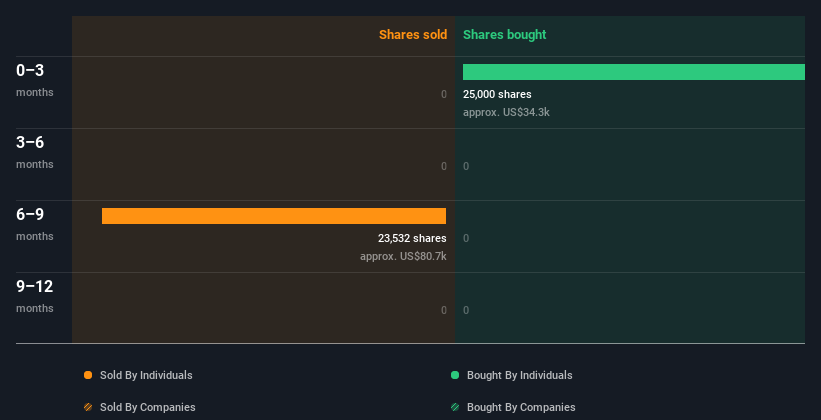Stock Analysis

Even though Longeveron Inc. (NASDAQ:LGVN) has fallen by 12% over the past week , insiders who sold US$82k worth of stock over the past year have had less luck. Given that the average selling price of US$3.47 is still lower than the current share price, insiders would probably have been better off keeping their shares.
While insider transactions are not the most important thing when it comes to long-term investing, logic dictates you should pay some attention to whether insiders are buying or selling shares.
See our latest analysis for Longeveron
The Last 12 Months Of Insider Transactions At Longeveron
Over the last year, we can see that the biggest insider sale was by the insider, James Clavijo, for US$82k worth of shares, at about US$3.51 per share. While insider selling is a negative, to us, it is more negative if the shares are sold at a lower price. The good news is that this large sale was at well above current price of US$0.51. So it may not shed much light on insider confidence at current levels. The only individual insider seller over the last year was James Clavijo.
Happily, we note that in the last year insiders paid US$34k for 25.00k shares. But they sold 23.53k shares for US$82k. The chart below shows insider transactions (by companies and individuals) over the last year. By clicking on the graph below, you can see the precise details of each insider transaction!

I will like Longeveron better if I see some big insider buys. While we wait, check out this free list of growing companies with considerable, recent, insider buying.
Longeveron Insiders Bought Stock Recently
We saw some Longeveron insider buying shares in the last three months. Insiders shelled out US$34k for shares in that time. We like it when there are only buyers, and no sellers. But in this case the amount purchased means the recent transaction may not be very meaningful on its own.
Does Longeveron Boast High Insider Ownership?
Many investors like to check how much of a company is owned by insiders. A high insider ownership often makes company leadership more mindful of shareholder interests. It's great to see that Longeveron insiders own 51% of the company, worth about US$6.5m. This kind of significant ownership by insiders does generally increase the chance that the company is run in the interest of all shareholders.
So What Do The Longeveron Insider Transactions Indicate?
We note a that there has been a bit of insider buying recently (but no selling). The net investment is not enough to encourage us much. It's heartening that insiders own plenty of stock, but we'd like to see more insider buying, since the last year of Longeveron insider transactions don't fill us with confidence. So these insider transactions can help us build a thesis about the stock, but it's also worthwhile knowing the risks facing this company. Our analysis shows 6 warning signs for Longeveron (2 don't sit too well with us!) and we strongly recommend you look at these before investing.
But note: Longeveron may not be the best stock to buy. So take a peek at this free list of interesting companies with high ROE and low debt.
For the purposes of this article, insiders are those individuals who report their transactions to the relevant regulatory body. We currently account for open market transactions and private dispositions of direct interests only, but not derivative transactions or indirect interests.
Valuation is complex, but we're helping make it simple.
Find out whether Longeveron is potentially over or undervalued by checking out our comprehensive analysis, which includes fair value estimates, risks and warnings, dividends, insider transactions and financial health.
View the Free AnalysisHave feedback on this article? Concerned about the content? Get in touch with us directly. Alternatively, email editorial-team (at) simplywallst.com.
This article by Simply Wall St is general in nature. We provide commentary based on historical data and analyst forecasts only using an unbiased methodology and our articles are not intended to be financial advice. It does not constitute a recommendation to buy or sell any stock, and does not take account of your objectives, or your financial situation. We aim to bring you long-term focused analysis driven by fundamental data. Note that our analysis may not factor in the latest price-sensitive company announcements or qualitative material. Simply Wall St has no position in any stocks mentioned.
About NasdaqCM:LGVN
Longeveron
A clinical stage biotechnology company, develops cellular therapies for aging-related and life-threatening conditions in the United States and Japan.
Excellent balance sheet and fair value.


